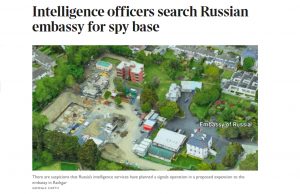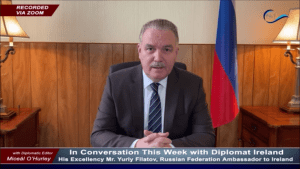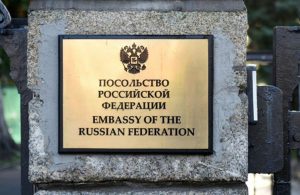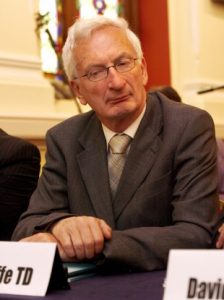by Miceál O’Hurley
Diplomatic Editor
Dublin – Last Friday, 12 February 2021, the Times (London) published an article with a startling headline, Intelligence officers search Russian embassy for spy base, the lead of which levelled an equally alarming claim, “The security services are conducting a new review of ongoing construction works at the Russian embassy in south Dublin to establish if it contains a spy base.” The headline purporting an Embassy in Ireland had been made subject to a ‘search’ set off a firestorm of speculation.
Inability to Independently Verify the Foundations of the Article

Facts are now in dispute. The Times (London) relies on un-named sources, un-attributed to any organisation. Upon sober investigation, the headline proved grossly misleading and the content of the article highly speculative.
Amongst other criticisms, it appears the Times (London) failed to exercise customary journalistic practices. A review of the article is absent of any discernable indication the Times (London) sought prior publication comment from either the Defence Forces, An Garda Síochána or the Department of Foreign Affairs, whatsoever. The only direct source citation undergirding the article is a vague and unattributed quote from ‘one security source’:
“Every Russian embassy in the world has intelligence officers working under diplomatic cover. What marks Russian embassy in Dublin apart is that it is used as a collection point for intelligence collected from across Europe. The Russian embassy in Prague is used as a support base for operations in Germany. Ireland plays that role for Russian espionage in Britain and countries like France and Holland,” one security source said.
It is not discernable if that source is connected to either the Defence Forces, An Garda Síochána, Government, or possibly an external security expert at a think tank and with what knowledge or authority they speak.

The veracity of the foundations of the article remain unclear at this time. Notably, the Times (London) article is void of any indication the author sought the customary prior publication comment from the Russian Federation Embassy in Dublin, who is the object of the article. What appears instead is a aged quote referring to a comment attributed to the Russian Ambassador, His Excellency Mr. Yuriy Filatov, more than six months previously.
In all, the article relies at best on what it describes as ‘suspicions’ or ‘concerns’ by unnamed intelligence officials and, contrary to the bombastic headline which asserts the Embassy underwent a ‘search,’ the article describes the purported actions of the Defence Forces and An Garda Síochána as being limited alternatively to either a ‘review’ or ‘assessment’. Both are a far cry from a ‘search’ of an Embassy, a rare event that would demonstrate the most serious of steps in diplomatic circles and one surely to provoke a formal protest.

When contacted for comment by Diplomat Ireland, the Defence Forces Press Office declined to comment and An Garda Síochána invoked their long-held policy, “An Garda Síochána does not comment on matters of national or international security.”
If there is a leak in Ireland’s security apparatus such that an informed person in authority is sharing classified information and/or analysis with persons outside of the intelligence community it would be a matter of significant concern for the Irish Government. If the link is external, the reliability of the third-party information would come squarely into question, even if it appeals to reason given past experience in Ireland and internationally.
Protections of the Vienna Convention on Diplomatic Relations , 1961
It is an established principle of international law as provided for in the Vienna Convention on Diplomatic Relations that the premises of credentialed missions are to be treated with significant care by host governments. This is not to say that governments do not have a right to enforce certain laws regulating the properties. However, a ‘search’ of a mission is an extraordinary event and would pose a serious breach of Article 22 of the Vienna Convention which states the following:
Article 22
- The premises of the mission shall be inviolable. The agents of the receiving State may not enter them, except with the consent of the head of the mission.
- The receiving State is under a special duty to take all appropriate steps to protect the premises of the mission against any intrusion or damage and to prevent any disturbance of the peace of the mission or impairment of its dignity.
- The premises of the mission, their furnishings and other property thereon and the means of transport of the mission shall be immune from search, requisition, attachment or execution. [emphasis added]
and, Article 24, which protects the work product of missions, would also fall under the protection from a ‘search’ as described by the Times (London):
Article 24
The archives and documents of the mission shall be inviolable at any time and wherever they may be.
Russian Embassy Responds
Upon being contacted by Diplomat Ireland the Russian Federation appeared dumbfounded by the Times (London) article. Through a Press Secretary, the Russian Federation remains steadfast in their denial the construction project they hoped to have completed last summer on Orwell Road, Rathgar, South County Dublin is connected to covert intelligence activities, insisting it is essentially a Consular bloc.

Government clearly differs in its assessment. Citing the construction as being “likely to be harmful to the security and defence of the State and the State’s relations with other states,” then Taoiseach Leo Varadkar and Minister Eoghan Murphy signed an Order halting construction and rescinding planning permission at the Russian Federation Embassy compound on 4 March 2020. The Order was uploaded on the digital version of the Irish Statute book on 3 April 2020, during the lockdown, without comment.
Contacted by Diplomat Ireland concerning Friday’s Times (London) publication, Ms. Victoria Loginova, Press Secretary for the Russian Federation Embassy in Ireland, provided the following Statement:
- It is a long-standing policy of the Embassy not to comment on our communications with the Irish Government.
- The Embassy is aware of the Irish Government Order, revoking earlier license for the part of the Embassy’s reconstruction project. We believe it to be groundless, senseless and unacceptable. On top of all that, it is a clear violation of the Vienna Convention, in particular, Article 25, which states that the receiving State shall accord full facilities for the performance of the functions of the mission. All that is known to the Irish side, which is aware of our disposition to resolve any outstanding issues through dialogue.
- The project of renovation of the Embassy is exactly about making working and living conditions of its staff better. The current Embassy premises (which are more than 110 years old) do not conform in any way to the sanitary and working space conditions established by the Russian Government regulations. The renovation project provides for the new consular section building, two apartment blocks and an addition to the current office building, mainly a big reception hall, kitchen, storage and recreation area, plus an underground parking.
- There is nothing in the project that could be even remotely linked to the issues of security, particularly, to “the security and defense of the (Irish) State”. It is equally difficult to envisage in what way the more comfortable Embassy’s office and its living quarters could be harmful to “the (Irish) State’s relations with other states”.

History of Russian Intelligence Operations in Ireland
Former Taoiseach Garrett Fitzgerald disclosed to the Irish Independent in 2010 that when he was Taoiseach, Ireland expelled the three Soviet diplomats.
In 1983, First Secretary and Press Attaché of the Soviet Embassy in Dublin, Guennadi Saline (purportedly codenamed ‘Silver‘), along with Second Secretary Viktor Lipassov and his wife Evdokia, were declared persona non grata for engaging in “improper activities that had involved the use of our territory for the secret transfer of information concerning the military affairs of the United States”. It fell to then Minister of State Jim O’Keeffe (Fine Gael) to deliver the news to the Russians, what he later described as “a first”, adding “certainly to me but in fact it had never happened in the history of the country”. O’Keeffe added, “I also was to make it clear that the wife was not being expelled merely because she was a wife, she was directly mentioned as also having been involved in unacceptable activities.”
Ms. Lipassov was thought to have been a KGB agent who used the lack of passport regulations between the United Kingdom and Ireland to exceed travel restrictions then imposed on Soviet diplomats and their families and have her movements go undetected (Times, 12 September 1983). Saline was outside of Ireland at the time of his expulsion and never returned to Ireland. Mr. Lipassov has since publicly asserted his innocence.
Operating in the open, the three were accused of using the main concourse of the Stillorgan Shopping Centre in South County Dublin to pass secrets gleaned through espionage. It was alleged at the time that the three accused Soviet spies operated from the Soviet Embassy in Ireland and held frequent meetings with the Worker’s Party, a Soviet-oriented, left-wing organisation that arose from Sinn Féin and Irish Republican Army dissention. State Papers since released provide no further information on the matter. Irish Intelligence agents discovered the ring and tricked them into attempting to pass information in the Stillorgan Shopping Centre.

In 2010, the Department of Foreign Affairs also began investigating reports that a ‘Russian Spy Ring’ had used forged Irish passports to engage in ‘deep cover’ espionage in the United States. The investigation came on the heels of an unrelated investigation that concluded Mossad, a key agency in Israel’s intelligence apparatus, used forged Irish passports to enter Dubai to assassinate a Hamas operative. Ireland expelled an Israeli diplomat in connection with that incident.
Ultimately, the Gardaí asserted there existed an “entirely persuasive picture of Russian intelligence service involvement in the manufacture and use of false documents based on the acquisition of six genuine passports belonging to Irish citizens,” according to the Department of Foreign Affairs. In 2011, Ireland declared a diplomat at the Russian Embassy as persona non grata and expelled them from Ireland in relation to the passport forging operation.
Ireland Joined EU and International Partners in Expelling Russian Diplomat After Skripal Poisoning
Ireland was amongst countries from North America to the European Union that expelled Russian diplomats in the aftermath of the United Kingdom concluding the Russian Federation was behind the 2018 poisoning of Sergei Skripal, a former Russian intelligence officer, and his daughter Julia Skripal. Ireland notified the Russian Federation Ambassador that it had declared on of its diplomats persona non grata, requiring them to depart Ireland. There was no indication that particular diplomat was singled-out because of any belief they were part of the Russian intelligence apparatus. However, speculation ensued none-the-less.
Russian Embassy Construction Dispute Comes Amid Renewed Tensions
The expulsion of Russian diplomats in 1983 for spying, and again in 2010 owing to the forged passport scandal, was considered startling given Russia and Ireland’s previously good relations. Indeed, the 2010 even led Ireland to protest that Russia had violated its Neutrality. Again, in 2018, following the Skripal poisoning (noteworthy as being the first time Ireland expelled a Russian diplomat based on United Kingdom intelligence) bilateral relations saw renewed tension. The revocation of planning permission for construction of the proposed Consular Bloc at the Russian Federation Embassy in South County Dublin in 2020 proved yet another seminal moment in the deterioration and strained bilateral relations between Ireland and the Russia Federation.

Accusations that Russian intelligence agencies, including the GU (formerly, GRU – military intelligence) and SVR (foreign intelligence) were elevated last summer that Russian intelligence operatives were actively scouting the underwater cables in Counties Cork and Mayo that provide a communications bridge between North America, Ireland and Continental Europe. At the time, speculation that Russia had increased anti-submarine and intelligence gathering flights off the Irish coasts raised further concerns. Russia continues to deny such accusations and asserts such flights are conducted in international air space as they have been for decades and pose no threat to Irish or international civil aviation.

The Times (London) report that Ireland’s intelligence services are prepared to brief the National Security Committee (sometimes referred to as Sub Committee ‘F’), which is Chaired by An Taoiseach Micheál Martin, only adds to a growing sense of alarm and stress between the Ireland and the Russian Federation. Such developments would be consistent, however, with the growing trend of disquiet amongst Ireland’s international partners following the devastating ‘Solar Winds’ computer breach.
Relations between the Russian Federation and Europe have been strained since Russia’s attempt to annex Crimea in 2014 and their support for the armed insurgency in Eastern Ukraine which has killed more than 13,000 people to date and displaced more than 1.3 million Ukrainians. The European Union imposed and has renewed sanctions against Russia since 2014. In Decmeber 2020, the Prosecutor for the international Criminal Court announced she believed there was a reasonable basis to believe human rights abuses had occurred in Russian occupied Ukraine.
The ‘Solar Winds’ breach involved alleged Russian hacking of software updates at their source which, when downloaded in regular maintenance by end users, including corporations, governments, banks and non-profits, gave hackers virtually undetectable access to entire networks. The United States government claims their networks were exploited for months, including significant tranches of confidential data, the extent of which is still being evaluated. The United States intelligence community laid blame at the feet of the Russian Federation for the breaches and theft of data. Governments throughout Europe are currently assessing the impact the ‘Solar Winds’ breaches posed to their own security and operations. It is unclear as to the extent of exposure Ireland was subjected in the ‘Solar Winds’ hacking. Russia denies the accusations it was behind the ‘Solar Winds’ infiltrations.
Earlier this month Europe’s High Representative/Vice-President, Josep Borrell, visited Russia, a visit which proved disappointing and brought Borrell under sharp criticism by many in Europe who claimed he “fell into Russia’s trap” and failed to better deteriorating relations. In an extraordinary move, Russia expelled three European diplomats whom they accused of participating in anti-Russian protests in support of dissident leader Alexei Navalny during a press conference in which Borrell was participating. The diplomats were from Germany, Sweden and Poland. Reportedly Russia failed to give Borrell advance notice of the action, allowing him to be surprised during a press conference.

Navalny, who was immediately arrested and detained upon returning from Germany in January where he had been treated for suspected Novichok poisoning, was quickly sentenced by Russia to three years imprisonment for purportedly breaching the terms of release from a previous conviction. Borrell did not visit Navalny during his visit to Moscow, as has been a customary practice, much to the criticism of many in the EU as well as human rights advocates.
Prior to February’s visit to Moscow, Borrell had expressed his specific desire to explore whether the Russian government was interested in undoing the many years of deterioration in the relationship with the EU prior to the upcoming EU-Russia summit scheduled for March. Upon his return, Borrell pointedly said, “The answer was clear: no, it is not.” Borrell added Russia had “no interest in a dialogue with the EU if human rights come as part of the package.”
Last week, Russian Federation Foreign Minister Sergey Lavrov further strained relations by indicating Moscow was prepared to sever ties with the EU if sanctions were imposed on Russia because of the Navalny affair or if Magnitzsky Act styled sanctions were imposed. Germany immediately declared Lavrov’s statement “disconcerting and incomprehensible.”
Uncertain Status and Resolution of Russian Federation Embassy Dispute
Russian Federation Ambassador, His Excellency Mr. Yuriy Filatov, has consistently maintained that Russia’s 110-year old Embassy is no longer fit for purpose. The construction project, for which Russia had previously obtained planning permission, is, according to Embassy, solely for the purposes of improved administration of Consular services, the comfort of the staff and to provide a few dormitory units for resident staff.

An unnamed source contacted by Diplomat Ireland, who serves as an analyst inside the intelligence community in the European Union, who is not authorised to speak on the matter, asserted his belief the Russian Federation probably already has intelligence officers operating from the Embassy and in Ireland, “Most nations embed intelligence officials in embassies. Russia is no different. What is unique in this matter is little seems to have changed since last year’s decision to stop construction leaving many of us to wonder if the assertion of renewed scrutiny isn’t simply the U.K. attempting to keep the issue on Ireland’s radar screen. The timing is curious.” Absent clarification from the Government, and with longstanding policies in place not to comment on national security matters, speculation as to the timing and source of the Times (London) article may simply remain a matter of speculation.
According to Ms. Loginova, Press Secretary of the Russian Embassy in Dublin, Ambassador Filatov has repeatedly offered to engage in dialogue with the Irish Government to resolve matters relating to the construction so that planning permission can be reinstated and the project completed. However, absent engagement from the Government in resolving the dispute, and if the report of the Times (London) proves accurate, the project seems stalled, indefinitely.
Diplomat Ireland contacted the Department of Foreign Affairs to ascertain if a ‘search’ of the mission had been conducted as well as provide an opportunity for comment prior to publication without success.















































